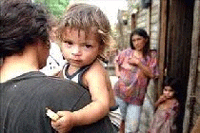Latin America’s fight against poverty advances slowly
A report issued by UN organisms in the region says that hunger, infant mortality and access to drinking water are far below standards
 "In the past five years, Latin America and the Caribbean have continued to advance in the fight against hunger, improving gender equity in education and access to drinking water, and reducing infant mortality, but the region still lags behind in meeting key Millennium Development Goals, such as halving extreme poverty, reducing maternal mortality, and the spread of HIV/AIDS, making primary education universal, and turning around the decline in the environment," reads the conclusions of an investigative report issued last week by the Economic Commission for Latin America and the Caribbean and the Pan American Health Organization (PAHO).
"In the past five years, Latin America and the Caribbean have continued to advance in the fight against hunger, improving gender equity in education and access to drinking water, and reducing infant mortality, but the region still lags behind in meeting key Millennium Development Goals, such as halving extreme poverty, reducing maternal mortality, and the spread of HIV/AIDS, making primary education universal, and turning around the decline in the environment," reads the conclusions of an investigative report issued last week by the Economic Commission for Latin America and the Caribbean and the Pan American Health Organization (PAHO).
The report comes in a very conflictive moment in the region, where several administrations – Bolivia, Ecuador - have fallen amid social protests and the lack of programs to fight poverty threats political instability across the region. According to these UN institutions poverty and inequality are the most serious challenges the region will face in the near future.
"Extreme poverty remains very high: 222 million Latin American and Caribbean people are poor, of these 96 million (18.6 percent of the population) are indigents," reads the document. Only Chile has halved extreme poverty and measures indicate that provided progress to date continues, Brazil, Costa Rica, Mexico, Panama and Uruguay could meet this goal. In the other countries, however, progress was poor or there was some slipping backward.
Argentina and Venezuela are the two countries that show the most worrying signals, despite both have been reverting bad figures in the period 2004-2005. Argentina duplicated its poverty figures after the 2001 crisis by reaching an unprecedented 50% poverty rate and 20% of indigency. However, figures started to improve since the worst of the crisis gone and they are getting down to 40% and 10% respectively.
"The region is on its way to meeting the goal regarding hunger, with 15 of 24 countries having reduced sub-nutrition. Countries are also expected to reduce infant malnutrition (children with lower than normal body weight) by half by 2015. But it is worrisome that the poorest countries, where the population has the most trouble gaining access to food, are the ones making the least progress," warned.
Unlike other developing areas, the region posts no significant gender inequality in education. Except for Bolivia, Guatemala and Peru, countries have met the goal and in some cases more women than men are completing primary and going on to secondary and university education. But women's income from work is 30 percent to 40 percent lower than men's, difficulties such as family violence persist, and there is still insufficient representation of women among parliamentarians.
But according to investigators, inequality is the theme underlying the whole of the scenario. "Latin America and the Caribbean is the least equitable region in the world: limited by low growth during lengthy periods, it has been unable to improve income distribution and access to productive assets, a situation aggravated by the lack of jobs that would allow workers to escape from poverty and their children to achieve adequate health care, education and food," the PAHO explained.
The governments of 189 countries adopted the Millennium Declaration in 2000, committing themselves to take concrete steps toward eradicating extreme poverty and hunger, making primary education universal, promoting equality between the sexes, improving infant health care, reversing environmental damage, and fostering worldwide cooperation for development.
Subscribe to Pravda.Ru Telegram channel, Facebook, RSS!





